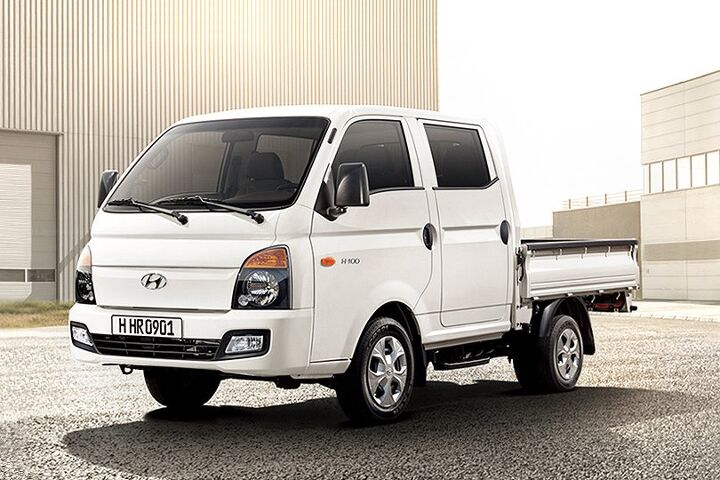A Proper Pickup Truck, Not Just a Santa Cruz, Is Being Considered For Production at Hyundai
“We’ve been talking about it for a number of years now,” Hyundai Australia’s chief operating officer, Scott Grant, said at the Genesis G70 global reveal.
No, he’s not talking about the G70, or any Genesis for that matter. He’s not talking about the H-100 pictured above. He’s not talking about the Tucson-based Hyundai Santa Cruz that finally seems destined for production after years of back-and-forth indecision.
Hyundai is now considering a true pickup truck. “We’re confident of having something on the other side of 2020,” Grant says.
Hyundai’s coming for your pickup truck market share, Nissan.
Of course, “the other side of 2020,” is not the most specific of timelines, but it’s one borne out of an otherwise predictable schedule that’s prioritizing other projects.
“About 12 months, 18 months ago, we began a study about developing a light commercial vehicle for our part of the market, as well as for what North America likes,” Hyundai Australia’s COO tells Motoring. Without KDM targeting or the global intentions of, say, the Hyundai Elantra, a HiLux/Tacoma-fighting pickup truck from Hyundai is bound to remain perpetually on the backburner.
Indeed, while Grant told Australian journalists that the Aussie subsidiary had been discussing such a project “for a number of years,” he also specified that the HQ in Seoul “has been listening, typically, but not necessarily taking a lot of action.”
That’s changed, Grant contends. While there’s no real timeline, the process of developing a proper pickup truck now involves “a far more vigorous study program in HMC [Hyundai Motor Corporation] than previously.”
“They were listening but not acting,” says Hyundai Australia’s COO. “Now they’re acting.”
In Australia, the Santa Cruz Concept isn’t believed to be capable of meeting the rugged needs of vehicles that top the sales charts. The Toyota HiLux and Ford Ranger rank as Australia’s No.1 and No.2 best-selling vehicles, respectively, and in August claimed 8 percent market share, combined.
Stateside, more than eight out of every ten pickup trucks sold are Detroit nameplates, leaving little space for yet another interloper from a non-traditional pickup truck builder.
Of course, there was a time, not that long ago in the grand history of the automobile, when Hyundai owned no slice of America’s passenger car market, either.
[Image Hyundai]
Timothy Cain is a contributing analyst at The Truth About Cars and Autofocus.ca and the founder and former editor of GoodCarBadCar.net. Follow on Twitter @timcaincars and Instagram.
More by Timothy Cain
Latest Car Reviews
Read moreLatest Product Reviews
Read moreRecent Comments
- Brian Uchida Laguna Seca, corkscrew, (drying track off in rental car prior to Superbike test session), at speed - turn 9 big Willow Springs racing a motorcycle,- at greater speed (but riding shotgun) - The Carrousel at Sears Point in a 1981 PA9 Osella 2 litre FIA racer with Eddie Lawson at the wheel! (apologies for not being brief!)
- Mister It wasn't helped any by the horrible fuel economy for what it was... something like 22mpg city, iirc.
- Lorenzo I shop for all-season tires that have good wet and dry pavement grip and use them year-round. Nothing works on black ice, and I stopped driving in snow long ago - I'll wait until the streets and highways are plowed, when all-seasons are good enough. After all, I don't live in Canada or deep in the snow zone.
- FormerFF I’m in Atlanta. The summers go on in April and come off in October. I have a Cayman that stays on summer tires year round and gets driven on winter days when the temperature gets above 45 F and it’s dry, which is usually at least once a week.
- Kwik_Shift_Pro4X I've never driven anything that would justify having summer tires.



































Comments
Join the conversation
If you add weight to a vehicle and a tall boxy profile it will get less mpgs. That is the problem when you add two extra doors and safety equipment. There are no true compact trucks offered by the manufacturers just as there are no true mini-vans (mini-vans in name only but not mini in size).
We don't need any more "proper" pickups. We need some Rancheros and El Caminos. Ford did it first, using the compact Falcon platform, then GM made the El Camino from its mid-size Malibu platform. The modern equivalent would be a Focus-based Ranchero and a Cruze-based El Camino. Landscapers, small time haulers, and home gardeners need a replacement for their Rangers, and married men need the upscale models to avoid having to take the kids and mother-in-law to the hardware store with them. That's a big market that wouldn't impact the full size pickup market.